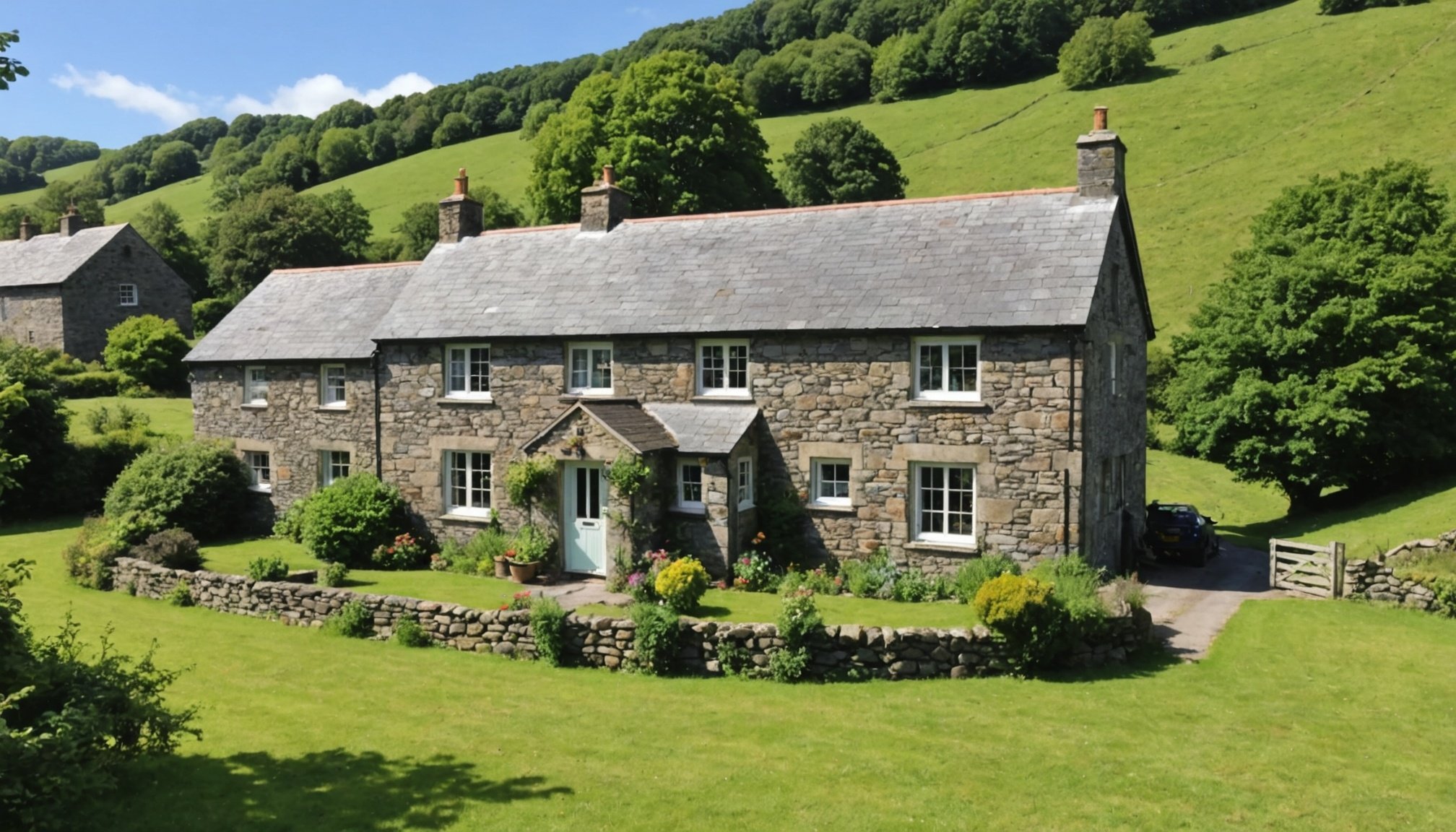Location Analysis
When considering the location of a farmhouse in Wales, it is essential to evaluate its proximity to nearby towns and cities. Accessibility is crucial for maintaining a balanced lifestyle, offering the best of both rural tranquillity and urban convenience.
In assessing a farmhouse’s countryside attributes, one should consider the availability of local amenities. Proximity to schools is vital for families, ensuring a smooth daily routine. Being close to shops and healthcare facilities can significantly impact day-to-day comfort and needs, reducing travel time and providing peace of mind.
A voir aussi : Essential Environmental Considerations for Purchasing Your Dream Rural Property in Cornwall
Moreover, residing in a rural location influences lifestyle choices. The countryside offers unique benefits, such as scenic landscapes and a peaceful environment ideal for relaxation and outdoor activities. However, these perks should be weighed against potential limitations, like longer commutes or fewer entertainment options.
In summary, thoroughly analyzing the location’s attributes helps determine how suited it is to your lifestyle. Access to amenities, connectivity, and the serene backdrop of the Welsh countryside are pivotal in shaping your choices, ensuring a harmonious blend of rural charm with necessary conveniences.
Cela peut vous intéresser : Essential Guide: How to Verify a Lead-Free Property in London Before You Buy
Architectural Styles
In the scenic landscapes of Wales, traditional Welsh farmhouse architecture stands out, embodying both historical significance and functional design. These farmhouses often feature unique elements that reflect the geographical and cultural influences of the region. Historically, the design styles were dictated by the availability of local materials and intended functionality, demonstrating a resourceful approach to construction.
The most prevalent historical features in these farmhouses include thick stone walls, primarily made from locally sourced stone, which provide excellent insulation against the harsh Welsh climate. Another common element is the low, sloping roofs covered with slate, a material also readily available in Wales.
When exploring design styles, one can notice a simplicity yet robustness in the structures, often encompassing large, central hearths essential for heating and cooking. These features not only denote a practical lifestyle but also highlight the ingenuity embedded in Welsh farmhouse designs.
Unique architectural features like cruck frames and rounded ends give these farmhouses a distinctive character, blending seamlessly with the rural environment. Understanding these features offers insight into how traditional craftsmanship has shaped the architectural heritage of Wales, leaving a lasting imprint on its cultural landscape.
Property Size and Features
Choosing the right property dimensions is vital when searching for a farmhouse. Your ideal property size greatly depends on personal needs and objectives. A smaller area may be suitable for a cozy home or hobby farming, while larger tracts are essential for commercial ventures.
When considering essential farmhouse features, examine the presence of outbuildings, such as barns and sheds. These structures are crucial for storage, workshops, or housing livestock. Lush gardens can contribute to sustainable living by providing fresh produce. Meanwhile, fields offer space for crops, grazing, or recreational activities, ensuring harmony with rural living.
Understanding land characteristics is similarly important. Topography, soil quality, and water access directly affect agricultural potential and property maintenance. Additionally, ascertain the property’s climate and drainage patterns to avoid future headaches.
Land use and zoning regulations are often overlooked, yet crucial elements in property selection. These rules dictate allowable activities on your land, like farming, building, or conservation efforts. Familiarising yourself with these guidelines beforehand prevents frustration and ensures your vision can be realized. By comprehensively assessing these factors, you’ll make informed decisions aligned with your aspirations.
Budget Considerations
When planning to purchase a farmhouse within a set farmhouse budget, various costs must be considered. Beyond the purchase price, consider additional expenses such as taxes and insurance. These often-overlooked costs can significantly inflate the total expenditure. To manage these financial obligations, exploring different financing options, like mortgages specifically tailored for rural properties, can offer flexibility and affordability. Mortgages for rural properties often differ from urban loans in terms and conditions, reflecting factors unique to such locations.
Valuing rural properties can pose challenges due to varying market conditions. Therefore, it is crucial to compare property valuation in the target area against others. This comparison involves assessing local market trends and understanding the potential for investment growth. Analysis of property values can lead to better-informed decisions, ultimately ensuring alignment with the desired farmhouse budget. A comprehensive approach to these considerations can alleviate potential financial strain and provide a sustainable way forward.
Understanding these key factors will empower buyers to navigate the complex farm property market with confidence, securing a suitable rural home without compromising financial stability or farm living aspirations.
Legal Aspects of Purchasing Farmland
Understanding the legal requirements for purchasing farmland is crucial for any prospective buyer. Local zoning laws and agricultural regulations can influence how the land may be used. Knowing these laws ensures compliance and avoids potential legal disputes.
One of the first steps is familiarising oneself with the farmland purchasing laws specific to the area. These laws dictate what types of activities are permissible on the land. In some regions, there may be restrictions on changing the land’s use or subdividing it.
It is also essential to secure the proper legal documents. These include property surveys, title deeds, and any existing land use agreements. Ensuring all property rights are correctly assigned prevents future complications. Essential processes might involve:
- Secure a comprehensive land survey.
- Verify the title deed is clear of encumbrances.
- Understand existing easements or land use agreements.
Engaging professionals such as solicitors and surveyors can help navigate these complexities. A solicitor can provide advice on contractual matters, while a surveyor can offer insights into the land’s value and potential issues. This expertise ensures a smoother transaction process, aligning with legal requirements.
Renovation Tips
Revamping a farmhouse renovation can be both exciting and challenging. It’s crucial to start by identifying key areas that need attention, whether that involves structural repairs or aesthetic updates. Charmingly, blending modern amenities without compromising on historical character is often the goal of successful restoration projects. This balance can be achieved by highlighting the property’s unique historical elements, such as original woodwork or stone fireplaces, while modernizing areas like kitchens and bathrooms for functionality.
To navigate this balance, prioritize which features must be preserved and which aspects offer room for contemporary improvements. An often-overlooked aspect in renovation is considering sustainable upgrades. For enthusiasts focused on sustainable living, this can mean incorporating energy-efficient solutions like solar panels or geothermal heating, which reduce environmental impact and enhance energy efficiency.
Sustainable upgrades can involve simple steps such as installing energy-saving light fixtures or opting for eco-friendly insulation materials. These not only improve the home’s carbon footprint but also lead to long-term financial savings. Ultimately, paying attention to both historical preservation and sustainability can lead to a harmonious renovation, providing a home that is both beautiful and eco-conscious.
Advantages of Living in the Welsh Countryside
Living in the Welsh countryside offers remarkable benefits that enhance the rural lifestyle. One of the most significant advantages is the strong sense of community engagement. In rural areas, neighbours are often more connected, fostering a supportive and close-knit environment. This community connection can lead to lifelong friendships and a shared commitment to local traditions, creating a unique living experience.
Another notable benefit is the proximity to nature, which brings about numerous health advantages. The countryside provides easy access to open spaces and clean air, encouraging outdoor activities such as hiking or cycling. These activities not only improve physical well-being but also enhance mental health by reducing stress levels and promoting relaxation and mindfulness.
The Welsh countryside is rich in unique cultural experiences. It is a region steeped in history and local customs. Residents can immerse themselves in village fairs, traditional music, and crafts that are deeply rooted in Welsh heritage. This cultural tapestry offers an enriching lifestyle for those looking to embrace a more authentic and fulfilling way of life.
In summary, countryside living offers a blend of rural lifestyle benefits through community ties, health improvements, and cultural engagement, making it an attractive option for many.











